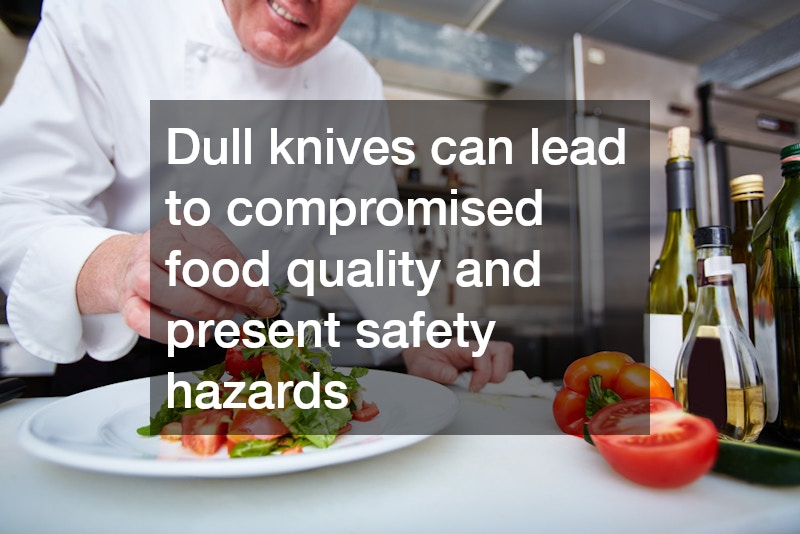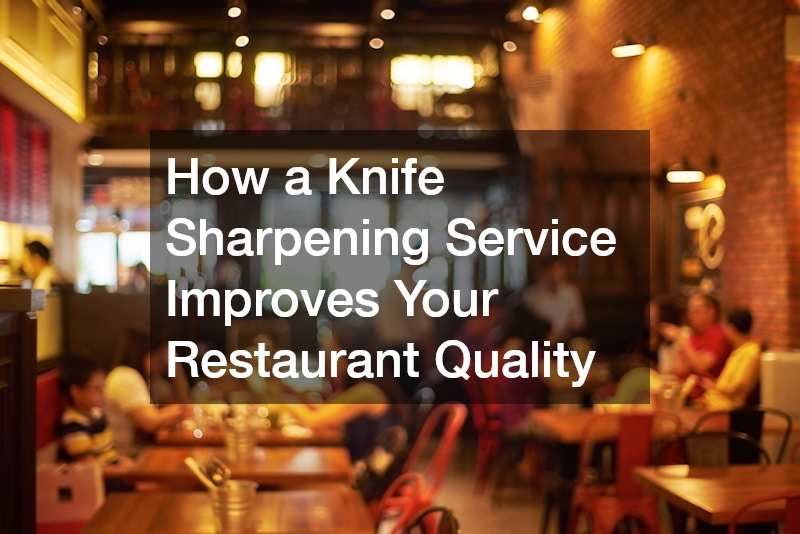In the competitive world of the restaurant industry, maintaining high standards of food quality is paramount. A knife sharpening service can help your restaurant meet this standard. One often overlooked aspect is the sharpness of kitchen knives.
This article explores how professional knife sharpening services can significantly elevate your restaurant’s food quality and efficiency.
In the fast-paced world of professional kitchens, every second and every slice counts. Behind every beautifully plated dish lies the precision and consistency that only well-maintained knives can provide. Sharp knives not only enhance efficiency and accuracy during food preparation but also contribute directly to the overall quality and presentation of each meal served. For restaurants aiming to uphold the highest culinary standards, investing in professional knife sharpening services is not just a matter of convenience—it’s a matter of maintaining excellence. By ensuring blades remain in peak condition, these services support cleaner cuts, safer work environments, and a consistently superior dining experience that reflects the skill and care of the kitchen itself.
Why Is Knife Sharpness Important for Restaurants?
Understanding the critical role of sharp knives in food preparation and presentation can help restaurants improve their culinary outcomes. Sharp knives enable chefs to make clean, precise cuts, which not only enhance the visual appeal of dishes but also ensure that the ingredients release their natural flavors. When vegetables and proteins are cut cleanly, they retain their juices and texture, offering patrons a superior dining experience.
Furthermore, using sharp knives can lead to improved kitchen efficiency. Chefs can work faster and with greater ease, allowing restaurants to serve meals promptly. This efficiency can be a crucial differentiator in a busy kitchen where timing is everything.
How Often Should Restaurants Utilize Knife Sharpening Services?
The frequency of knife sharpening is influenced by various factors, including the volume of food prepared and the types of knives used. Discover the best practices for maintaining your knives.
For restaurants that operate with high volume and diverse menus, it is recommended to have knives professionally sharpened every 1-2 weeks. This frequency ensures that knives maintain optimal sharpness and can cope with the demands of frequent use.
Additionally, the type of knives in use matters greatly; for instance, a chef’s knife may require different care than a paring knife. Understanding each knife’s specific sharpening needs contributes to effective kitchen management and helps in planning sharpening schedules.
What Are the Benefits of Using a Professional Knife Sharpening Service?
Professional sharpening services offer various advantages compared to in-house sharpening. Learn what makes professional services worth the investment.
One major benefit of utilizing a professional service is the consistency and quality of the sharpening process. Professionals use high-quality equipment and techniques that ensure blades are sharpened to the correct angle and finish, something that can be challenging to achieve with basic in-house methods.
Moreover, professional sharpeners are often aware of the latest trends and technologies in knife care. The insights they provide can save restaurants money in the long run, as they help prevent premature knife deterioration and the need for replacements.
Can Dull Knives Affect Food Quality and Safety?
Dull knives can lead to compromised food quality and present safety hazards in the kitchen. Explore the implications of using unsharpened knives.
Using dull knives can significantly alter the taste and texture of food. Inadequately cut ingredients can lead to uneven cooking, resulting in food that is overcooked in some areas while undercooked in others, which is less appealing to diners.
Additionally, dull knives require more force to cut through food, which can lead to accidents and injuries in the kitchen. Safety should always be a priority, and ensuring that knives are sharp is a simple yet effective measure to reduce the risk of harm.
What Types of Knives Should Restaurants Get Sharpened?
Different types of knives are used in restaurant kitchens, and not all may require the same sharpening approach. Find out which knives should be prioritized for professional sharpening.
Typically, essential knives like chef’s knives, cleavers, and paring knives should be prioritized for professional sharpening due to their frequent use and critical role in food preparation. Ensuring these tools are always sharp will directly impact the quality of the meals served.
Conversely, specialty knives, such as filleting or bread knives, may not need sharpening as often, but should not be overlooked. Tailoring the sharpening schedule based on the knife type and usage frequency ensures a well-maintained set of kitchen tools.
Investing in a knife sharpening service can have a profound impact on your restaurant’s food quality and kitchen efficiency. By ensuring that your knives are always in optimal condition, you can enhance both the taste and presentation of your culinary creations.
Professional knife sharpening services play an essential role in sustaining the quality, safety, and reputation of any restaurant. Dull knives can compromise not only the precision of each cut but also the speed and safety of kitchen operations—factors that directly influence customer satisfaction and overall efficiency. By keeping blades in optimal condition, restaurants demonstrate their commitment to culinary excellence and to the craftsmanship that defines great dining experiences. Regular sharpening ensures that chefs can work confidently and effectively, allowing their skill and creativity to shine through in every dish served.




